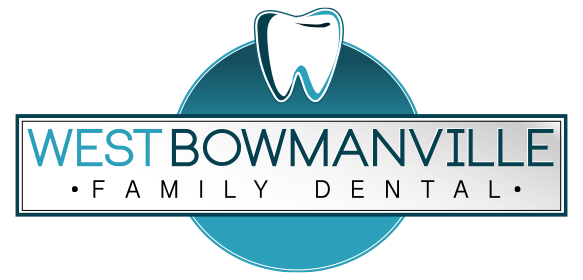Gum disease is also called periodontal disease and is incredibly common. Initially, the disease begins as gingivitis but can quickly worsen into more advanced periodontal disease without professional dental care in Bowmanville.
What is Gingivitis?
Gingivitis is a mild infection and inflammation of the gums, so instead of your gums looking a nice healthy pink, they can start to look swollen and red and are more likely to bleed when you brush or floss. The most common cause of gingivitis is plaque buildup. Dental plaque is a sticky biofilm containing harmful bacteria that continually forms on your teeth and gums. It also increases the risk of cavities.
If you fail to brush and floss thoroughly and frequently enough, plaque will continue to build up and hardens into tartar (calculus) within a couple of days. This is why your regular scale and polish appointments with our hygienist at West Bowmanville Family Dental are so important, as we scale or remove all tartar buildup, helping you to maintain strong and healthy gums and cavity-free teeth more easily.
The Dangers of Gum Disease
Gingivitis in Newcastle might not seem like such a big deal, and it is easily reversible with the right professional dental care. However, ignoring these early warning signs will allow gingivitis to progress into severe periodontal disease, which is considerably more serious. The risk of losing teeth is much higher since periodontal disease destroys the structures holding your teeth in place, including gums, jawbone and ligaments. The infection and inflammation caused by advanced gum disease can also affect overall health, as those harmful bacteria in plaque can enter your bloodstream via bleeding gums, and the infection can worsen existing health conditions or increase your risk of developing them, including heart disease, diabetes and respiratory illnesses.
But, back to the question. Can you catch gingivitis?
The bacteria that cause gingivitis can be passed from one person to another, especially if they have periodontal disease or poor oral hygiene and where more bacteria are present in their mouth. These bacteria can be transferred from one mouth to another through kissing, sharing utensils and food, and sharing toothbrushes. This is why children who have parents with periodontal disease are more likely to develop gingivitis or tooth decay since their parents will probably kiss them frequently and share utensils or will have licked a dropped pacifier before returning it to a baby.
What to Do to Avoid Gingivitis
Although gingivitis is common, it is preventable through common sense and good oral care. Ensure you never share utensils with others, even if they are good friends or family, especially if you know they are not great about looking after their teeth and gums in Clarington. You should never share a toothbrush with anyone since it will have high numbers of bacteria on the bristles. If you share a bathroom with others, ensure your toothbrush is placed upright to dry well away from their toothbrushes and where the air can circulate freely. When a toothbrush is damp, then bacteria can thrive more easily. Make sure you replace your toothbrush regularly, every three months or more often if it looks worn.
Finally, see our dentist for regular checkups and hygiene appointments in Courtice. If you have gingivitis, then we can detect the signs at an early stage. We carefully monitor the gum health of all our patients, taking measurements at each appointment so we can check for signs of changes since the last time we saw you and provide appropriate treatment that much earlier when needed. We can also offer advice on brushing and flossing effectively so your mouth remains beautifully clean, fresh and healthy.

